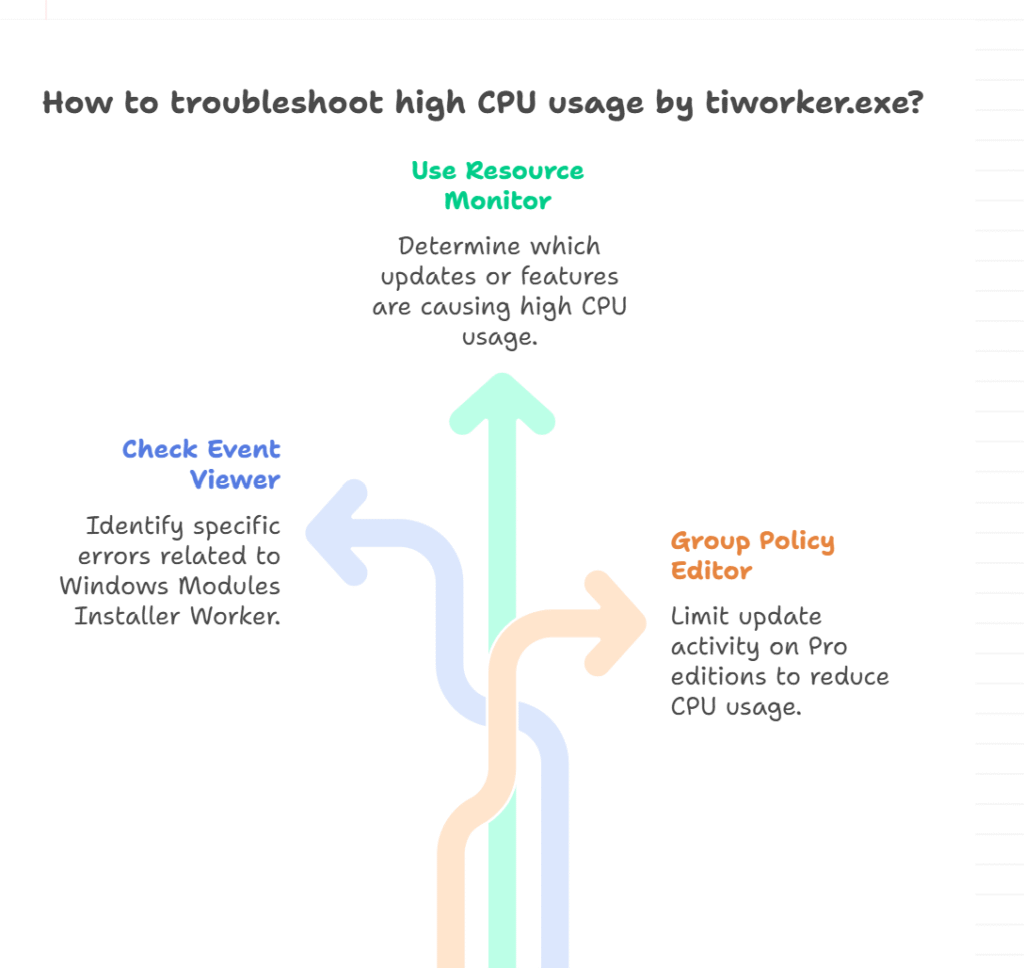tiworker.exe eating up your CPU or disk, you’re not alone. In fact, “tiworker.exe” is one of the most searched Windows processes in 2025. But what is tiworker.exe, and why does it sometimes cause your computer to slow down? Is it a virus, or is it something your PC actually needs? Let’s break down everything you need to know about tiworker.exe, from what it does to how you can manage it—without the tech jargon.
What Is TiWorker.exe? The Windows Modules Installer Worker Explained
Let’s start with the basics: what is tiworker.exe? If you’re seeing this process in Task Manager, you’re probably using Windows 10, Windows 11, or even the latest Windows 12. TiWorker.exe stands for Trusted Installer Worker and is the executable for the Windows Modules Installer Worker service.
This process is responsible for handling Windows updates, installing new system modules, and making sure your operating system stays secure and up to date. It’s a core part of the Windows update mechanism, and it’s not a virus or malware.
But there’s more to it. TiWorker.exe is triggered whenever Windows checks for, downloads, or installs updates. It also runs when you add or remove Windows features. That’s why you might see it pop up unexpectedly, especially after Patch Tuesday or a big feature update.
Why Does TiWorker.exe Use So Much CPU or Disk?
Here’s the pain point: sometimes, tiworker.exe can cause high CPU or disk usage. You might notice your PC slowing down, fans spinning up, or apps lagging. This is especially common during or after Windows updates.
But why does tiworker.exe high disk or CPU usage happen? The answer is simple: when Windows is updating, it needs to check, download, and install a lot of files. TiWorker.exe handles all of this in the background. Sometimes, it can get stuck or use more resources than expected, especially if there are pending updates or issues with the update process.
“Every time I install updates, tiworker.exe goes wild and my laptop slows to a crawl. Is there any way to fix this?” — frustrated user, 2025
Let’s dig deeper into what’s really happening.
Breaking Down the Windows Modules Installer Worker
What Does the Windows Modules Installer Worker Do?
The Windows Modules Installer Worker (also known as TiWorker.exe) is a background service that manages the installation, modification, and removal of Windows updates and optional system components. It’s essential for keeping your system secure and running smoothly.
Whenever you install a new update, add a Windows feature, or even uninstall certain programs, the Windows Modules Installer Worker kicks in. It checks for dependencies, applies patches, and ensures everything is properly configured.
Why Is It Called TiWorker.exe?
TiWorker.exe is simply the name of the executable file for the Windows Modules Installer Worker. You’ll see it in Task Manager under “Processes” or “Details.” It’s normal for this process to appear during updates or system maintenance.
Is TiWorker.exe Safe? Can You Disable It?
Let’s clear up a common fear: tiworker.exe is not a virus. It’s a core part of Windows, and disabling it can break your ability to install or update Windows features and security patches. In fact, Windows will often restart the service if you try to end it.
That said, tiworker.exe should only run when needed. If it’s always active or causing constant high disk or CPU usage, something might be wrong. Let’s look at why this happens and what you can do about it.
Why Is TiWorker.exe Using So Much CPU or Disk? Common Causes in 2025
Windows Updates Running in the Background
Windows updates are more frequent and complex than ever. If you have a lot of pending updates, or if updates are stuck, tiworker.exe can use a ton of disk and CPU.
Corrupted Update Files
A corrupted Windows Update cache can cause tiworker.exe to get stuck in a loop, constantly trying (and failing) to process updates.
Pending Feature Installations
Sometimes, Windows updates include new features or optional components. If these get stuck, tiworker.exe can keep running in the background.
Malware or Third-Party Interference
While tiworker.exe itself isn’t malware, some viruses disguise themselves as system processes. Always run a scan if you’re unsure.
How to Fix TiWorker.exe High CPU or Disk Usage: Step-by-Step Solutions
Let’s get practical. If tiworker.exe is slowing down your PC, here’s what you can do:
Check for Windows Updates
Go to Settings > Windows Update and make sure your system is up to date. Sometimes, a stuck update is all it takes to trigger tiworker.exe high disk or CPU usage.
Run the Windows Update Troubleshooter
Windows 10, 11, and 12 all include a built-in troubleshooter for update problems. Go to Settings > Troubleshoot > Additional troubleshooters > Windows Update and run the tool. It can automatically fix many common issues.
Clear the Windows Update Cache
This is a classic fix. Open Command Prompt as administrator and run these commands one by one:
textnet stop wuauserv
net stop bits
ren C:\Windows\SoftwareDistribution SoftwareDistribution.old
net start wuauserv
net start bits
This will reset the update cache and often resolves stuck processes.
Scan for Malware
Use Windows Defender or your favorite antivirus to check for malware. If something is pretending to be tiworker.exe, you’ll want to catch it fast.
Limit Background App Activity
Go to Settings > Privacy > Background apps and turn off apps you don’t need running in the background. This reduces the load on your system during updates.
Real-Life Example: TiWorker.exe High CPU Usage Fixed
Let’s say you notice your laptop fan spinning up every time you open Task Manager. You see tiworker.exe using 80% of your CPU. You try the steps above—running the troubleshooter, clearing the update cache, and scanning for malware. Suddenly, your CPU usage drops, and your PC feels snappy again.
A user recently shared, “I thought my laptop was dying, but it was just tiworker.exe stuck on an update. One quick cache reset and it was fixed!”
Advanced Tips: Managing TiWorker.exe in 2025
Expert Tone
If you’re comfortable with advanced settings, you can dig deeper:
- Check Event Viewer: Look for errors related to Windows Modules Installer Worker.
- Use Resource Monitor: See exactly which updates or features are triggering tiworker.exe.
- Group Policy Editor: On Pro editions, you can limit update activity via Group Policy.
Just be careful—disabling core services can break Windows Update or even cause system errors.

Pros and Cons of TiWorker.exe
Pros
- Keeps your system updated and secure
- Manages installation of new features and security patches
- Runs only when needed (in most cases)
Cons
- Can cause high disk or CPU usage
- Sometimes gets stuck on updates
- Difficult to disable without breaking Windows Update
Features and Usability: TiWorker.exe in 2025
Microsoft has improved tiworker.exe over the years. In 2025, it’s more efficient, with better error handling and less frequent spikes. Still, on older hardware or with lots of pending updates, you might see occasional slowdowns.
Key features:
- Automatic update management
- Handles feature installations and removals
- Background operation for minimal disruption
- Improved resource management in Windows 12
Risks and Considerations
While tiworker.exe is safe, there are a few risks:
- Disabling it can break Windows Update
- High disk or CPU usage can slow down older PCs
- Rarely, malware can disguise itself as tiworker.exe
Always keep your system updated and run regular scans.
FAQs
Q. What is tiworker.exe and do I need it?
A. Tiworker.exe is a Windows process that manages updates and system features. You need it for installing, updating, and removing Windows components. It’s safe and built into Windows.
Q. Why is tiworker.exe using so much CPU or disk?
A. Tiworker.exe uses more resources when installing or updating Windows. If it’s always high, you might have stuck updates or a corrupted update cache.
Q. Can I disable tiworker.exe?
A. You can’t safely disable tiworker.exe without breaking Windows Update. It’s best to fix the underlying issue rather than try to end the process.
Q. Is tiworker.exe a virus?
A. No, tiworker.exe is not a virus. However, always scan your PC if you see suspicious behavior, as some malware can mimic system processes.
Final Thoughts
For most users, tiworker.exe is just another background process that keeps your system running smoothly. If you notice high CPU or disk usage, don’t panic—try the fixes above, and you’ll likely solve the problem in minutes.
CLICK HERE FOR MORE BLOG POSTS
“In a world of instant takes and AI-generated noise, John Authers writes like a human. His words carry weight—not just from knowledge, but from care. Readers don’t come to him for headlines; they come for meaning. He doesn’t just explain what happened—he helps you understand why it matters. That’s what sets him apart.”


This made me feel genuinely motivated — thank you!